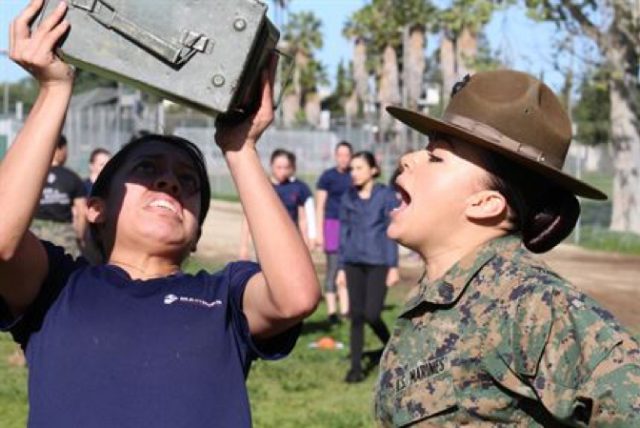
Photo Source: HiringAmerican.net
On this Veteran’s Day, I am reflecting on a Marine Corp Veteran that I met at the Folsom Veteran’s Day Parade a few years back. He was quite impressive; decked out in his Service Dress Uniform. Those of us that are familiar with the military can read a person’s uniform like a book. He was a sergeant with 8 years of service and had several tours of duty in Iraq. He had received a Purple Heart and a Navy Achievement Medal with Valor (indicating he had earned it in combat). When I had a chance to speak to him, he told me had been out for a year and had a hard time finding a job and was doing part time work for a landscaping company.
It really broke my heart to see a veteran of this caliber having difficulty finding a job after serving his country. In comparison, my transition from the Navy to the civilian work force was relatively easy. In hindsight, the big advantage I had was that my hiring manager was also a former Naval Officer and recognized the value of my training and experience.
Unfortunately, many civilian hiring managers may not recognize the value a service member brings to the workforce. As such, I would like to point them out in this article:
1. Extensive Leadership Training
I went through the NROTC Program at the University of Washington to get my commission. The best way that I can describe the program is that it’s a leadership lab. As a freshman, you start out at the bottom of the hierarchy as a Midshipman Fourth Class. As time progresses, you’ll gain more responsibility as your rank increases. You’re constantly given tasks that you have to achieve with your team. Initially, they’re pretty simple but as your rank grows, the number of people you lead also grows and subsequently, the tasks get more complex.
I received four years of leadership training before receiving my commission as an ensign. In comparison, what I have seen in the civilian world is that people are often promoted to a leadership position because of good performance in their job. For example, a sales rep may get promoted because of his stellar performance in sales. However, as a leader of a sales team, he fails miserably. The reason? Leadership is a different skill than sales and sadly, his company provided no training.
If you hire a veteran, you can feel confident that not only have they had leadership training, but they also had practical leadership experience.
2. Team Work
Essential to leadership training is the ability to work in teams. The military is the great equalizer. People from all walks of life, religion, ethnicity, and social economic backgrounds come together and work as a team to accomplish a mission. I’ve seen sailors have to put aside their prejudices and work together as a team to get things done. So, for the requirement on a job description “must be a team player,” a veteran can checked this off.
3. Technically Trained with Relevant Experience
It is a misconception that veterans have no transferable skills to the civilian world and will have to be retrained in order to function. The military actually has vast and far reaching job training programs that range anywhere from dental hygienist, to construction electrician, from Oracle DBA to an airplane pilot. There are literally hundreds of different job occupations in the military. In addition, the military invests billions to train their personnel. For example, the cost to train a fifth generation fighter pilot is $11 million. If you’re looking to fill a job opening, there’s a really good chance that there are veterans out there that are both trained and experienced for the position you’re looking to fill.
4. Mission Orientated
One of values ingrained in service members is the importance of the mission. In a chaotic world, the mission remains the underlining purpose and service members are trained to overcome obstacles in order to accomplish the mission. The best description of being mission orientated on a job description is “Goal Orientated.”
5. Attention to Detail
When I first went to boot camp, almost every aspect of our life was regulated. Our uniform was to be worn in exacting precision, our beds had to be meticulously made, and even our underwear had to be folded precisely. After a while, a service member can recognize when things are out of place. Details matter. A missed aligned valve on a ship can spell disaster.
Most situations in the civilian world aren’t so dramatic. However, details still matter. Sloppy coding causes bugs. Flawed analysis can cause poor market fit. Shoddy accounting can lead to audits. When looking at veteran for a job opportunity, remember that person was trained to pay attention to detail.

Photo By: Staff Sgt. Alicia R. Leaders
6. Performance under Pressure
You’ve probably seen movies where there’s a drill instructor yelling at the top of their voice at a new recruit. I’ve certainly experienced an upper classman yelling at the top of his lungs just inches from my face. Do you ever wonder why the military does this? It’s to simulate stress on an individual. The theory is that if they can simulate stress in a training environment, the service member will be able to function during combat. I have personally been able to learn to function during stressful situations. Mentally, I force myself to think about what the immediate objectives are and focus on accomplishing those objectives.
During the civilian world, there’s seldom any situation that comes close to combat. However, there are stressful situations where it is imperative that an employee not panic and continue to work towards solving a problem. This is where many veterans have learned to thrive.
Final Thoughts
The point is that it makes good business sense to hire a veteran. You don’t have to feel that you should hire them out of a sense of patriotism or charity. In fact, there are recruiting firms that have recognized this and actively recruit service members transitioning to the civilian world.
The thing that you should be cognizant of is that a person leaving military service may have a hard time translating their performance in the military in civilian terms. For example a squad leader can be translated as supervisor. A company commander can be described as a department head.
I have personally mentored a few members and had a hard time understanding their resume because it was full of military jargon. If you do encounter this, give them the benefit of the doubt and explore how their experience may apply to the position they are applying for. I’m sure you will be pleasantly surprised.













